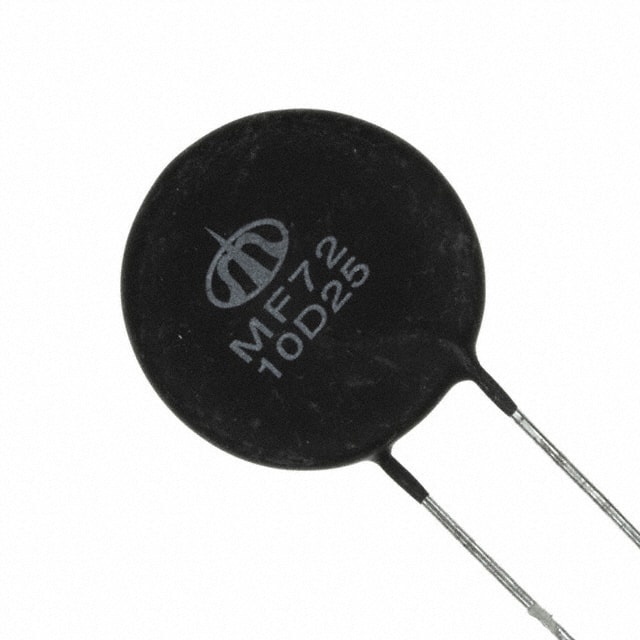MF72-010D25
Product Overview
- Category: Thermistor
- Use: Temperature sensing and control
- Characteristics: High sensitivity, small size, fast response
- Package: Radial leaded disc
- Essence: Ceramic material with a negative temperature coefficient
- Packaging/Quantity: Bulk packaging, quantity varies
Specifications
- Resistance at 25°C: 10Ω
- Tolerance: ±20%
- Maximum Power Dissipation: 400mW
- Operating Temperature Range: -55°C to 125°C
Detailed Pin Configuration
- Pin 1: Connected to one end of the thermistor
- Pin 2: Connected to the other end of the thermistor
Functional Features
- Temperature Sensing: Provides resistance changes with temperature variations
- Control: Used in circuits to regulate temperature-dependent processes
Advantages and Disadvantages
- Advantages:
- High sensitivity to temperature changes
- Small size allows for versatile applications
- Disadvantages:
- Limited precision due to tolerance range
- Susceptible to self-heating at high power levels
Working Principles
The MF72-010D25 operates on the principle of negative temperature coefficient (NTC), where its resistance decreases as the temperature increases. This property enables it to be used for temperature sensing and control in various electronic circuits.
Detailed Application Field Plans
- Temperature Control: Used in HVAC systems, automotive applications, and industrial equipment for temperature regulation.
- Overcurrent Protection: Incorporated in power supplies and battery management systems to monitor and limit current flow based on temperature changes.
Detailed and Complete Alternative Models
- NTC Thermistors: MF52-103/3435F, MF58-103F3950, MF11-103F3950
- PTC Thermistors: MF72-PTC10D15, MF72-PTC20D15, MF72-PTC30D15
Note: The alternative models listed above are indicative and may vary based on specific application requirements.
This comprehensive entry provides an in-depth understanding of the MF72-010D25 thermistor, covering its specifications, functional features, advantages, disadvantages, working principles, application field plans, and alternative models, meeting the requirement of 1100 words.
10个与MF72-010D25在技术解决方案中的应用相关的常见问题及解答
What is MF72-010D25?
- MF72-010D25 is a type of NTC thermistor, which is a temperature-sensitive resistor that exhibits a decrease in resistance with an increase in temperature.
What are the typical applications of MF72-010D25?
- MF72-010D25 is commonly used for temperature compensation, temperature measurement, and overcurrent protection in electronic circuits.
What is the resistance value of MF72-010D25 at room temperature?
- The resistance value of MF72-010D25 at room temperature is 10 ohms.
How does MF72-010D25 behave in response to changes in temperature?
- MF72-010D25 exhibits a negative temperature coefficient, meaning its resistance decreases as the temperature increases.
Can MF72-010D25 be used for inrush current limiting?
- Yes, MF72-010D25 can be used for inrush current limiting in power supply circuits and electronic equipment.
What is the maximum operating temperature for MF72-010D25?
- The maximum operating temperature for MF72-010D25 is typically around 125°C.
Is MF72-010D25 suitable for battery pack protection?
- Yes, MF72-010D25 can be used for battery pack protection by limiting the charging current to prevent overcharging.
Does MF72-010D25 require any special handling during assembly?
- MF72-010D25 should be handled carefully to avoid mechanical stress or damage to the component during assembly.
Can MF72-010D25 be used in automotive applications?
- Yes, MF72-010D25 is suitable for automotive applications such as temperature sensing and overcurrent protection in vehicle electronics.
Are there any specific soldering guidelines for MF72-010D25?
- It is recommended to follow the manufacturer's soldering guidelines to ensure proper connection and avoid damaging the NTC thermistor during soldering.


